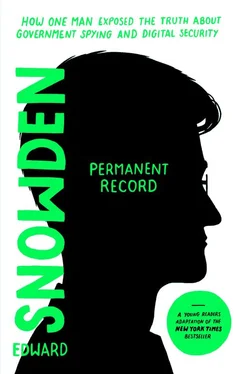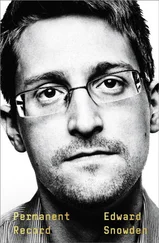* * *
Internationally, the disclosures helped to revive debates about surveillance. For the first time since the end of World War II, liberal democratic governments throughout the world were discussing privacy as the natural, inborn right of every man, woman, and child. The European Union became the first transnational body to establish a new directive that seeks to standardize whistleblower protections across its member states, along with a standardized legal framework for privacy protection. In 2016, the European Parliament passed the General Data Protection Regulation (GDPR).
The GDPR treats the citizens of the European Union, whom it calls “natural persons,” as also being “data subjects”—that is, people who generate personally identifiable data. In the US, data is usually regarded as the property of whoever collects it.
Today, no matter who you are, or where you are physically, you are also elsewhere. Our data wanders far and wide. Our data wanders endlessly.
We start generating this data before we are born, when technologies detect us in utero, and our data will continue to proliferate even after we die. Of course, our consciously created memories, the records that we choose to keep, comprise just a sliver of the information that has been wrung out of our lives—most of it unconsciously, or without our consent—by business and government surveillance. We are the first people in the history of the planet for whom this is true, the first people to be burdened with data immortality. This is why we have a special duty. We must ensure that these records of our pasts can’t be turned against us, or turned against our future children.
Today, a generation that wasn’t yet born when 9/11 took place, those whose entire lives have been spent under the omnipresent specter of this surveillance, is championing privacy. Their political creativity and technological ingenuity give me hope. You, the readers of this book, give me hope.
If we don’t reclaim our data now, future generations might not be able to do so. Then they, and their children, will be trapped, too.
Who among us can predict the future? Who would dare to? The answer to the first question is no one, really, and the answer to the second is everyone, especially every government and business on the planet. This is what that data of ours is used for. Algorithms analyze it for patterns of established behavior. A website that tells you that because you liked this book you might also like books by author A or author B isn’t offering an educated guess as much as a tool of subtle pressure and influence.
We can’t allow ourselves to be used in this way. We can’t permit our data to be used against us. We can’t let the godlike surveillance we’re under be used to “predict” our criminal activity. And as for our genetic information, our most intimate data: If we allow it to be used to identify us, then it will be used to victimize us, even to modify us.
Of course, all of the above has already happened.
* * *
Exile: When people ask me what my life is like now, I tend to answer that it’s a lot like theirs in that I spend a lot of time in front of the computer—reading, writing, interacting. From what the press likes to describe as an “undisclosed location”—which is really just whatever two-bedroom apartment in Moscow I happen to be renting—I beam myself onto stages around the world, speaking about the protection of civil liberties in the digital age to audiences of students, scholars, lawmakers, and technologists.
Some days I take virtual meetings. Other days I just pick up some Burger King. One fixture of my existence is my daily check-in with my American lawyer, confidant, and all-around consigliere Ben Wizner at the ACLU, who has been my guide to the world as it is and puts up with my musings about the world as it should be.
That’s my life. It got significantly brighter during the freezing winter of 2014, when Lindsay came to visit—the first time I’d seen her since Hawaii.
From the moment she arrived, my world was hers. Previously, I’d been content to hang around indoors—indeed, that was my preference—but Lindsay was insistent: She’d never been to Russia, and now we were going to be tourists together.
My Russian lawyer, Anatoly Kucherena, who helped me get asylum in the country, arranged two box seats at the Bolshoi Theatre. Lindsay and I got dressed and went, though I have to admit I was wary. There were so many people, all packed so tightly into a hall. Lindsay could sense my growing unease. As the lights dimmed and the curtain rose, she leaned over, nudged me in the ribs, and whispered, “None of these people are here for you. They’re here for this.”
Lindsay and I also spent time at some of Moscow’s museums. At the Tretyakov Gallery, a young tourist, a teenage girl, suddenly stepped between us. This wasn’t the first time I’d been recognized in public, but given Lindsay’s presence, it certainly threatened to be the most headline worthy. In German-accented English, the girl asked whether she could take a selfie with us. I’m not sure what explains my reaction, but without hesitation, for once, I agreed. Lindsay smiled as the girl posed between us and took a photo. Then, after a few sweet words of support, she departed.
I dragged Lindsay out of the museum a moment later. I was afraid that if the girl posted the photo to social media, we could be just minutes away from unwanted attention. I feel foolish now for thinking that. I kept nervously checking online, but the photo didn’t appear. Not that day, and not the day after. As far as I can tell, it was never shared—just kept as a private memory of a personal moment.
* * *
Whenever I go outside, I try to change my appearance a bit. Maybe I get rid of my beard; maybe I wear different glasses. I never liked the cold until I realized that a hat and scarf provide the world’s most convenient and inconspicuous anonymity. I change the rhythm and pace of my walk and look away from traffic when crossing the street, which is why I’ve never been caught on any of the car dash cams that are ubiquitous here. Passing buildings equipped with CCTV, I keep my head down, so that no one will see me as I’m usually seen online—head on. I used to worry about the bus and metro, but nowadays everybody’s too busy staring at their phones to give me a second glance. If I take a cab, I’ll have it pick me up at a bus or metro stop a few blocks away from where I live and drop me off at an address a few blocks away from where I’m going.
Today, I’m taking the long way around this vast, strange city, trying to find some roses. Red roses, white roses, even blue violets. Any flowers I can find. I don’t know the Russian names of any of them. I just grunt and point.
Lindsay’s Russian is better than mine. She also laughs more easily and is more patient and generous and kind.
Tonight, we’re celebrating our wedding anniversary. Yes, reader, she married me.
If you’ve gotten to this chapter, then you’ve done better than I did back in my school days. But even after reading every single chapter, you might still have some basic questions, such as: What can I do to protect my digital privacy as well as my family’s and friends’, and to protect our basic freedoms? It’s fine to make sweeping arguments about the need for technological and legal reforms, but what about some more practical information?
But there’s a problem with practical information: It tends to change, and to change rather quickly. If your goal is to keep yourself safe while using the internet, then you’re going to have to move at the pace of the internet. This is the main burden of being a young person, in any age: The young are always living at the cutting edge.
Читать дальше












